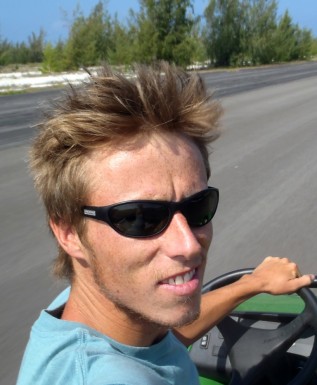In the first instalment in our series of Q&As with Blue Ventures staff, we ask Olivier Raynaud, our Maintirano and Barren Isles Project Coordinator, some searching questions about science, conservation and superpowers…
What is your scientific background?
My academic background is centred on engineering and the management of public environmental issues (such as the design and coordination of local initiatives to regulate natural resources exploitation), but my practical scientific know-how mainly results from various field experiences in the Pacific, Caribbean and Indian Ocean. It includes ecological monitoring, research on threatened species (seabirds, turtles, sharks), invasive species control and eradication, and socio-economic research.
Why do you do what you do?
The money! No, just kidding, I do it because I enjoy myself. This is a totally personal judgement, but to my knowledge, conservation is the only field that has enhanced my motivation and implication in a way that permits me to work in an efficient manner. My passion for nature and my somewhat subconscious need to spend time on issues that I find ethically rewarding, have catalyzed my involvement. At the moment I can’t imagine being as stimulated as I currently am, if I was working on any other mission than one aiming for the conservation of species, habitats and traditional livelihoods.
Why is scientific research important?
Whatever project it is that you are working on, success and
achievements will be linked to the notion of progress. The trick is that progress cannot be assessed unless you are in some way measuring, determining and analysing all relevant parameters. Scientific research allows you to justify and elaborate result-oriented, pertinent
strategies to start with, but more importantly it gives you the information necessary to evaluate the progress being made. Hence scientific research provides the knowledge necessary to steer and adjust action plans and strategies to ensure their efficiency.
What is the best/worst thing about being a conservation scientist?
It seems to me that the advantages and drawbacks of this profession are related to the feeling of working on legitimate, essential and challenging issues. The best part of the job is motivation; being aware how pertinent your tasks are, and realizing how this wonderful occupation is significant in light of worldwide issues and future generations.
The worst part of the job is frustration; realizing that despite
knowing it makes sense to invest time and effort in such a genuine and rightful cause, some other project stakeholders do not understand the need for and critical importance of these issues.
What do you enjoy most about your job?
What I enjoy the most is being out there! It’s a combination of simply enjoying personal interests and working on public interest issues on the spot. Because you’re constantly confronted to the local reality, some days you’re disappointed by unreasonable behaviours, cupidity of individuals or lack of concern in long term public interests, but that’s only some days. The rest of the time your reaction to events is predominantly paced by YES, WOW, or RIGHT ON!
Tell us a bit about the project you are currently working on and what will be the final result of the work
The project aims to protect some of Madagascar’s healthiest and most diverse coral reefs, and ensure the sustainability of local andtraditional livelihoods. Our strategy is based on the establishment of a Locally Managed Marine Area in the Barren Isles, on the West coast of Madagascar, and expected outcomes include the preservation of pelagic fish stocks and ecosystem services, local capacity building in conservation, development of alternative and durable livelihoods, and the obliteration of illegal, destructive practices.
What is your favourite species or group of species and why?
Recently, my favourite encounters have been with rays. Meeting with these majestic creatures makes any snorkelling/diving sessionswonderful; whether they’re spotted eagles, mantas or devil rays, observing these massive bird-like shapes smoothly fly through the water is quite a show. My admiration is also due to their very social behaviour: how crazy is it that when you scream underwater, one of these beautiful rays may turn around, and circle you slowly before it slowly moves away? One of the rare wild animals that seems to show respect
and politely say “Hi” to humans despite our generally reprehensible behaviour!
What would your science superhero power be?
It’d have to be the ability to travel in time, or more precisely to send other people in time! See, what constitutes the greatest asset in the Barren Isles is the current good health of ecosystems and the affluence of marine
resources. It’s an asset but it also brings major difficulties; how do you get people to adhere to conservation initiatives when today there are plenty of resources for everyone?
Being a superhero, I’d send a few community leaders to the Barren Isles in 2050, to make them realize that 2013’s prolific natural resources were exploited in a way that did not allow the regeneration of stocks. If we could make local communities realize the impacts that current practices potentially engender in the long term, that’d be a game
changer for conservation and our project!
Learn more about Olivier and his work


